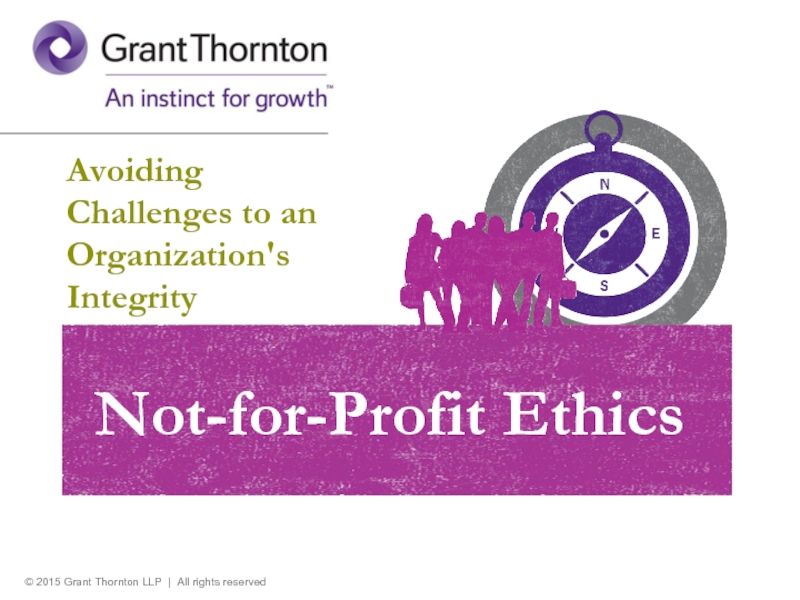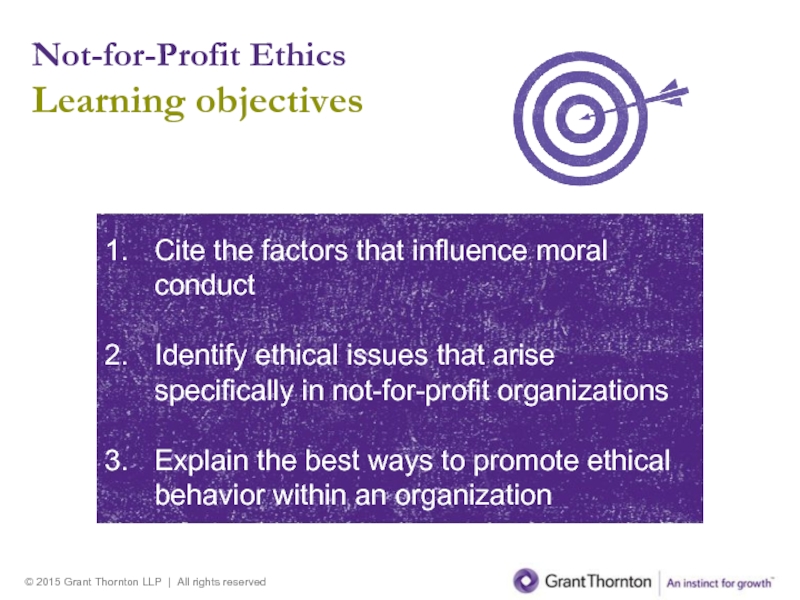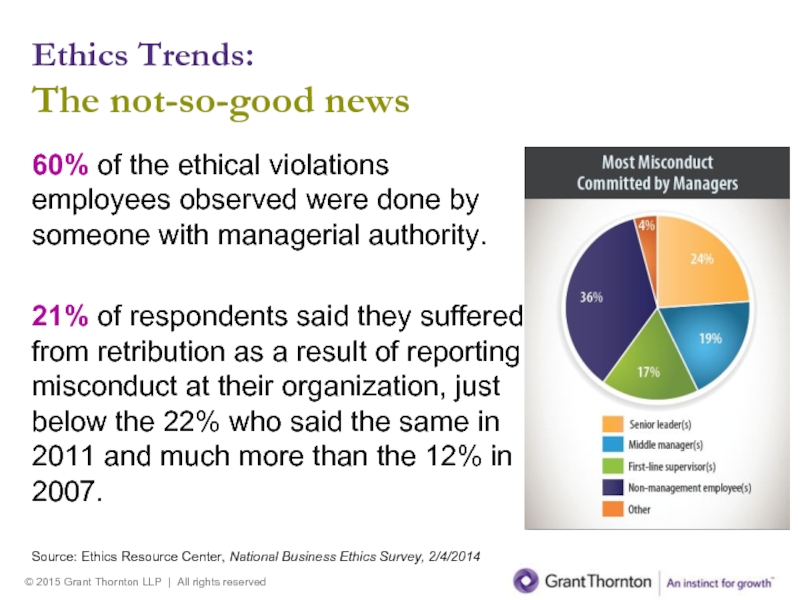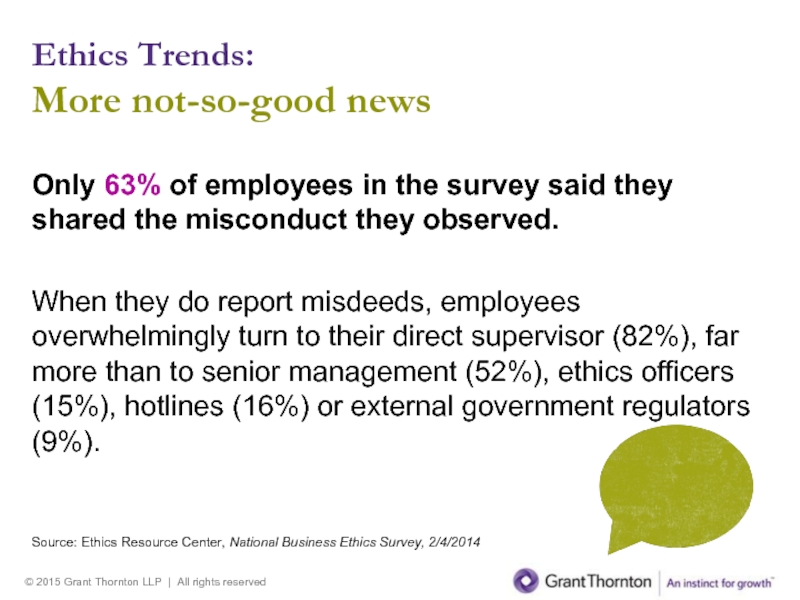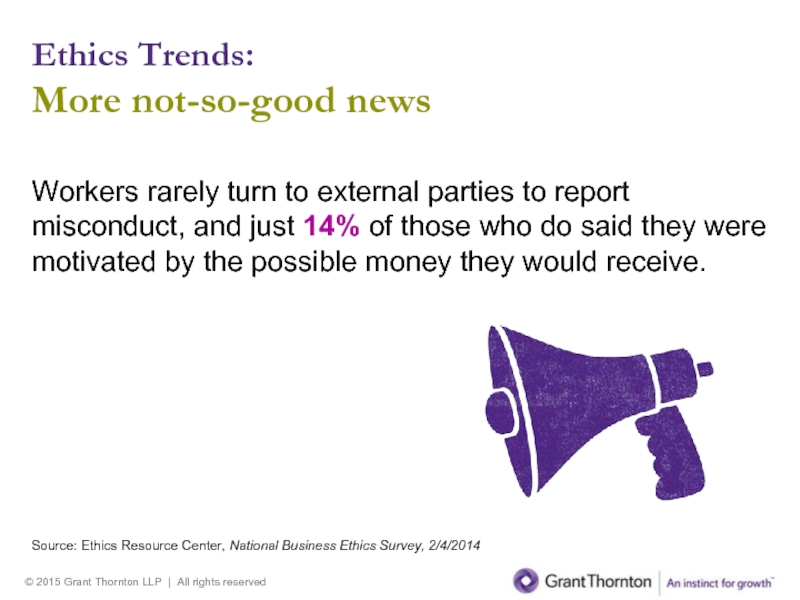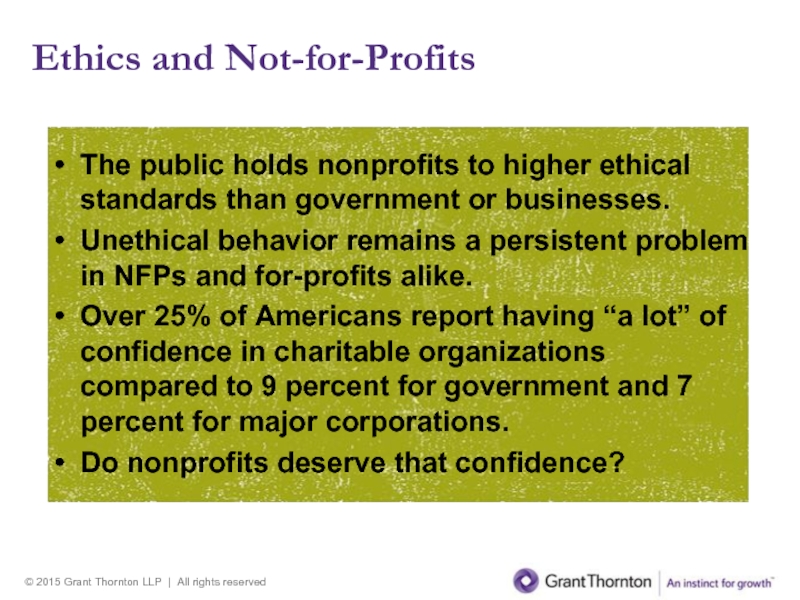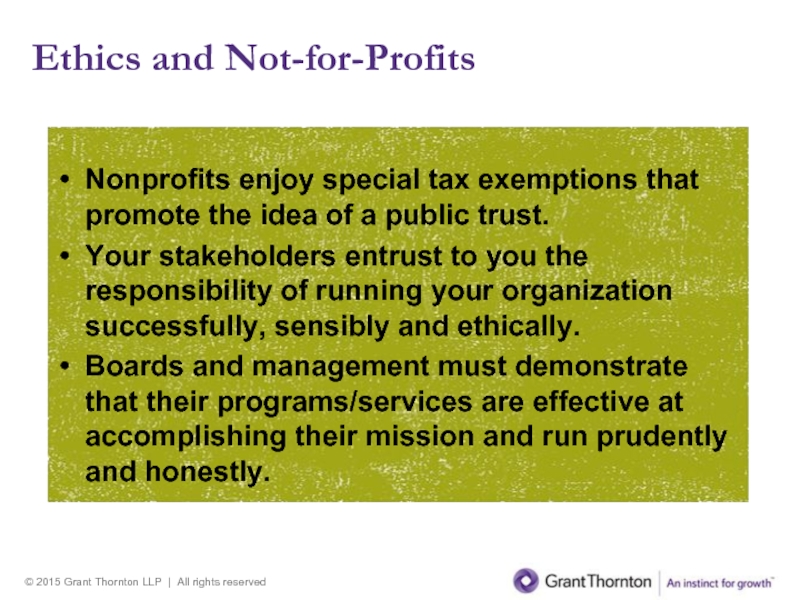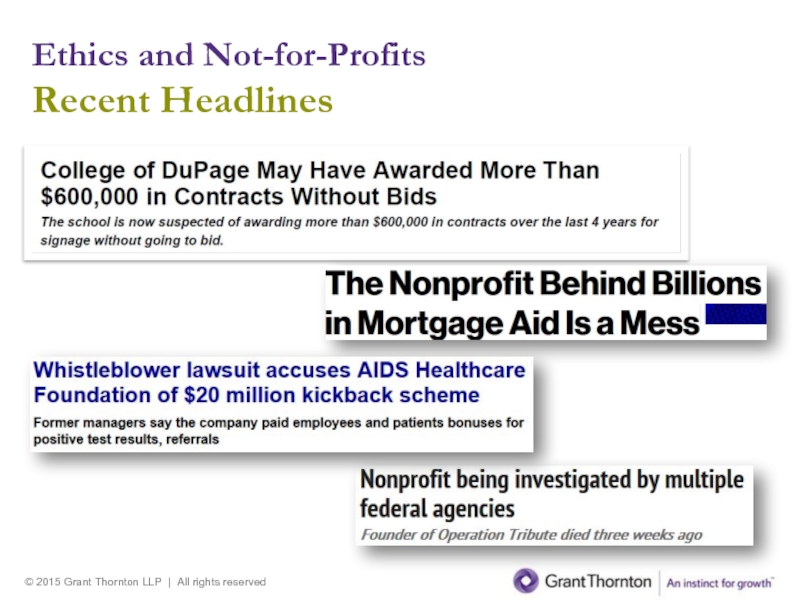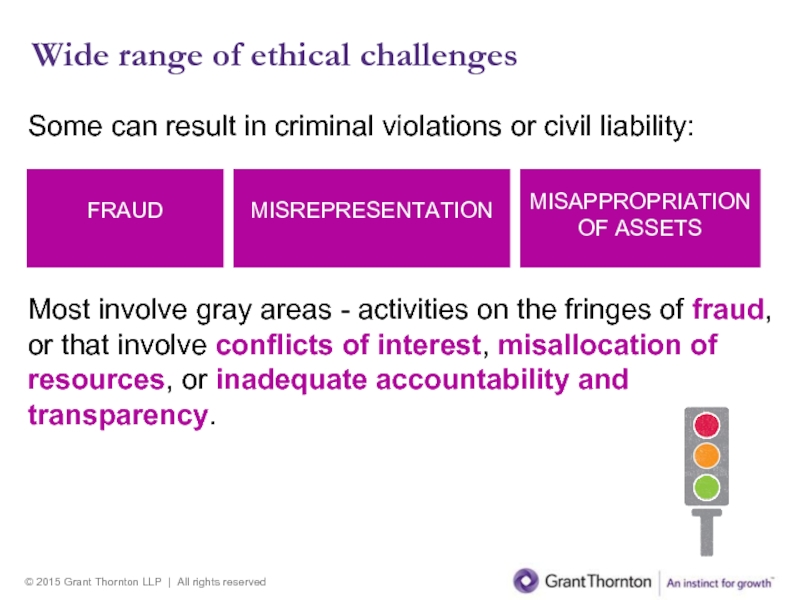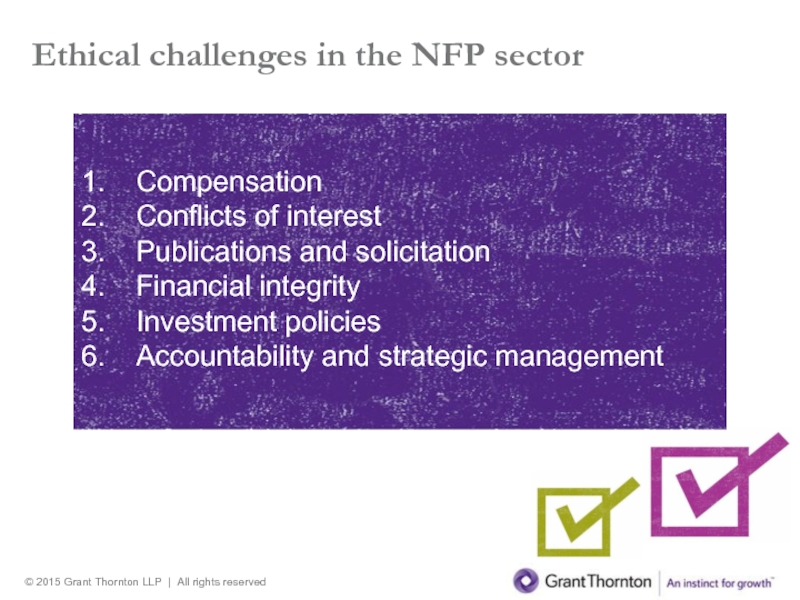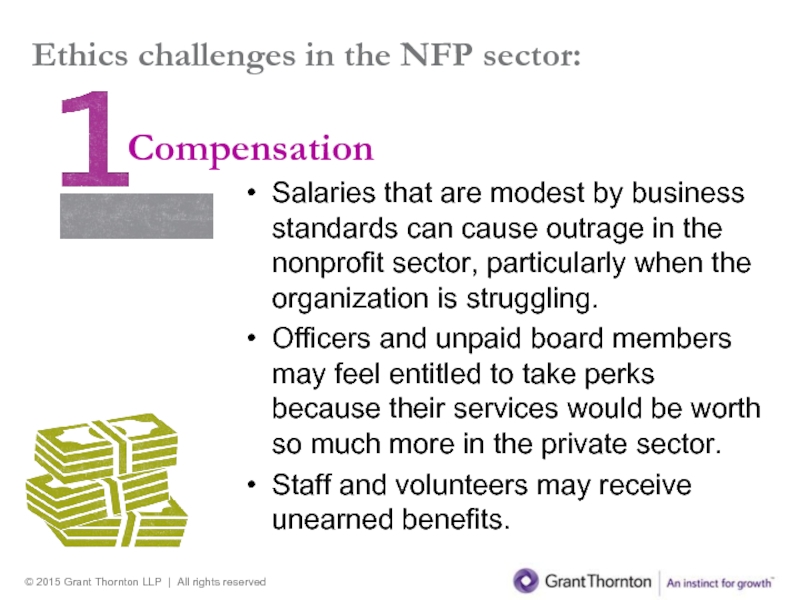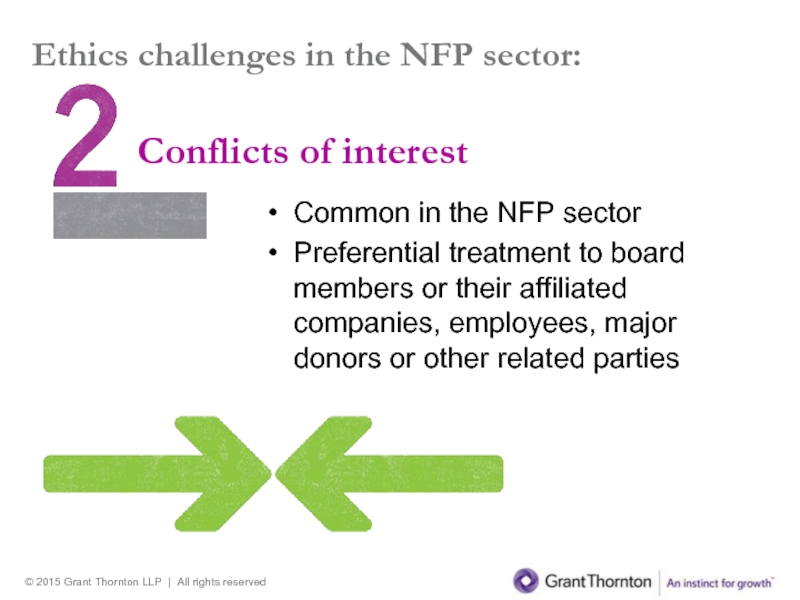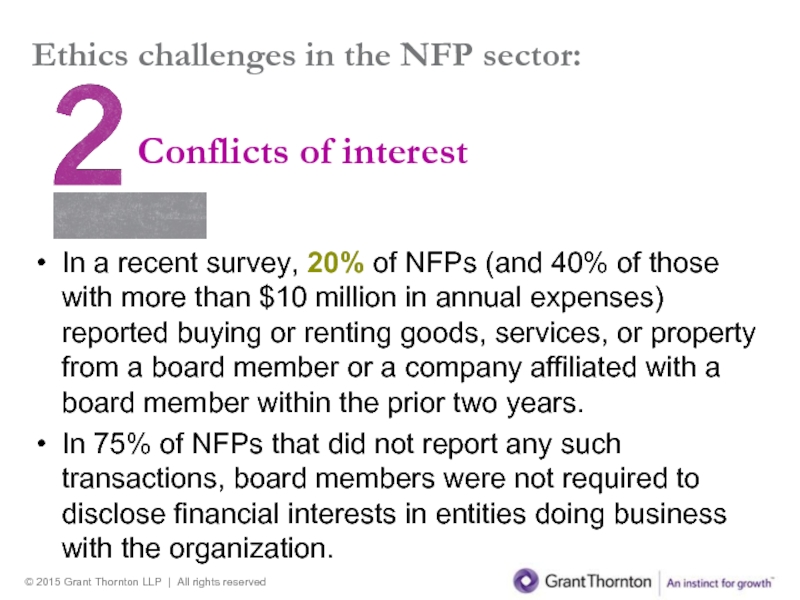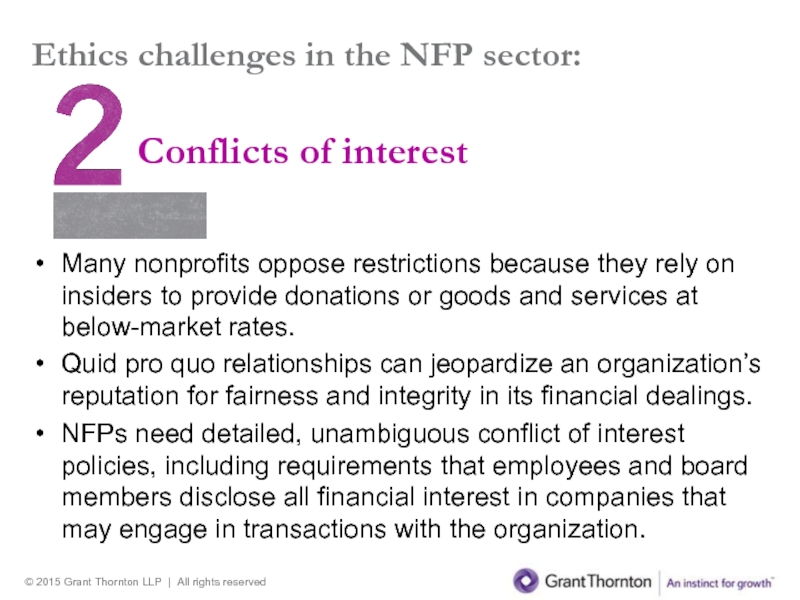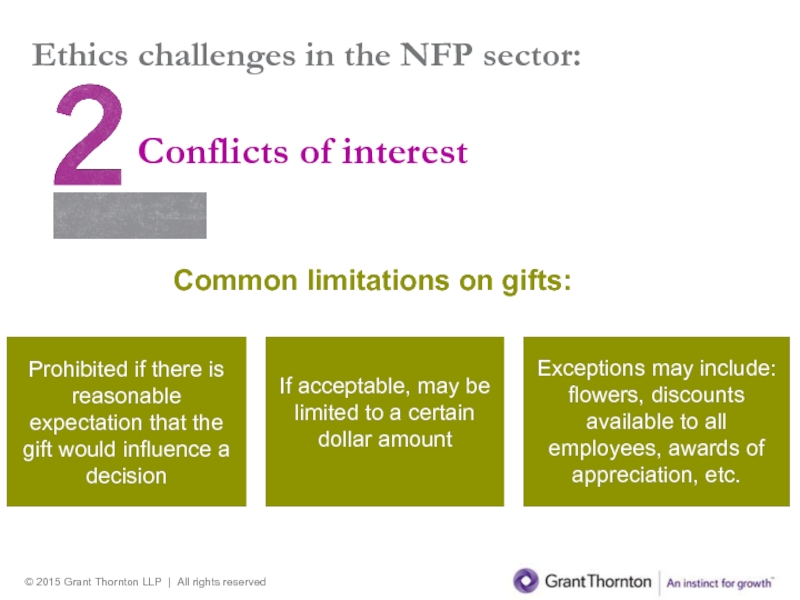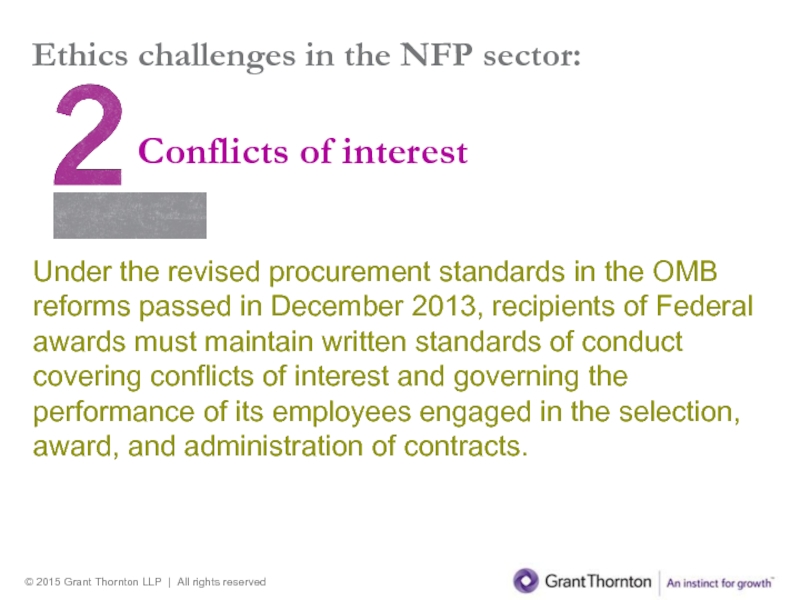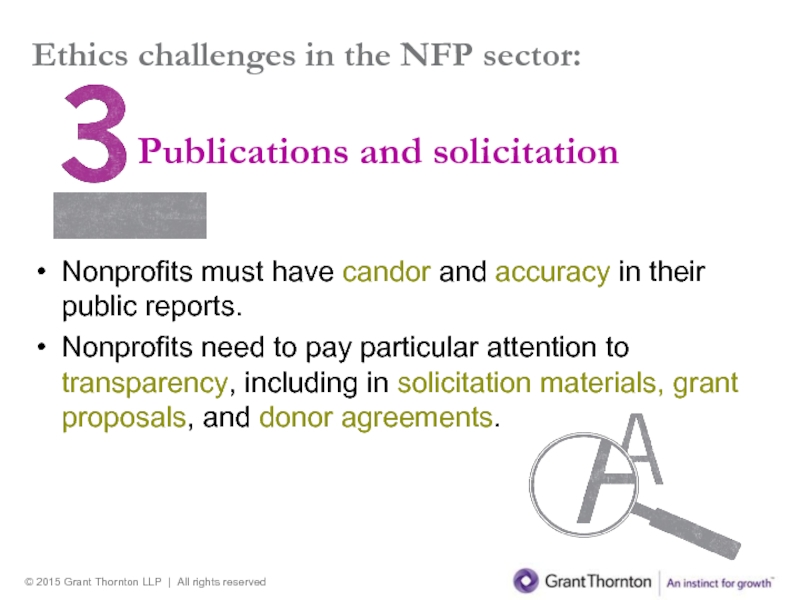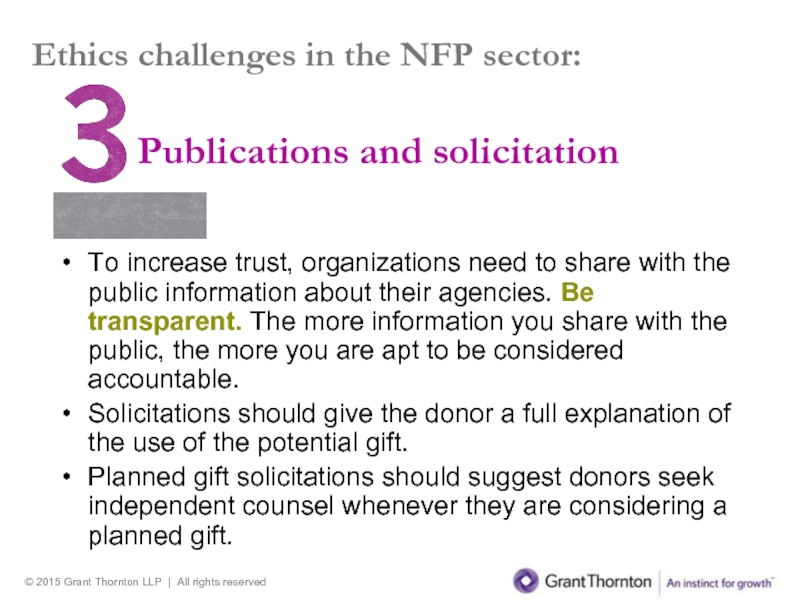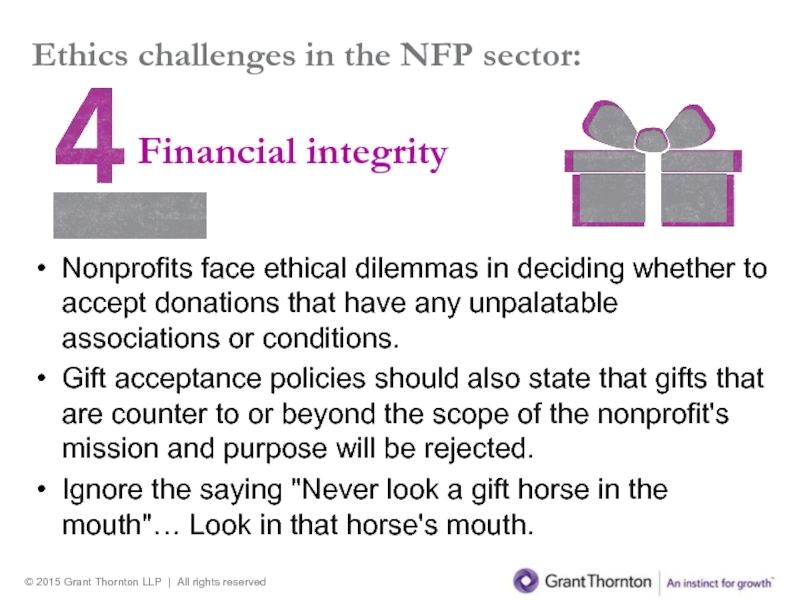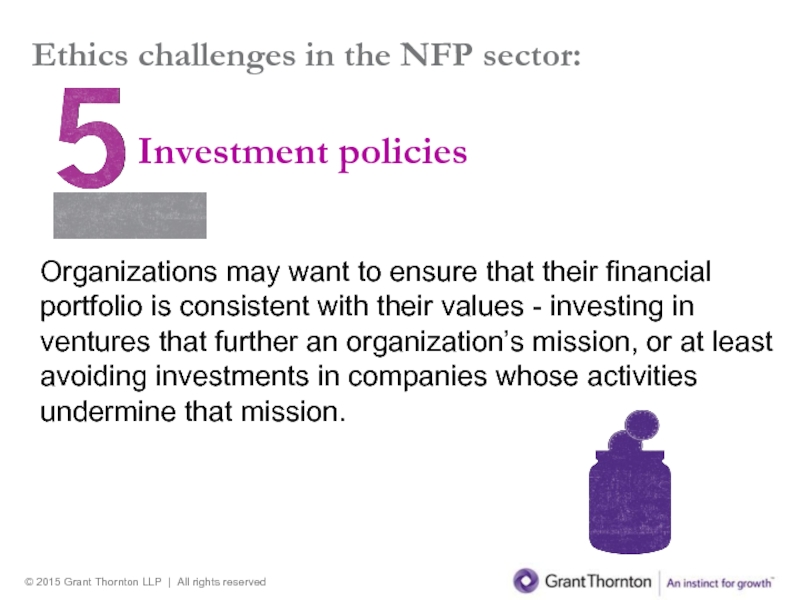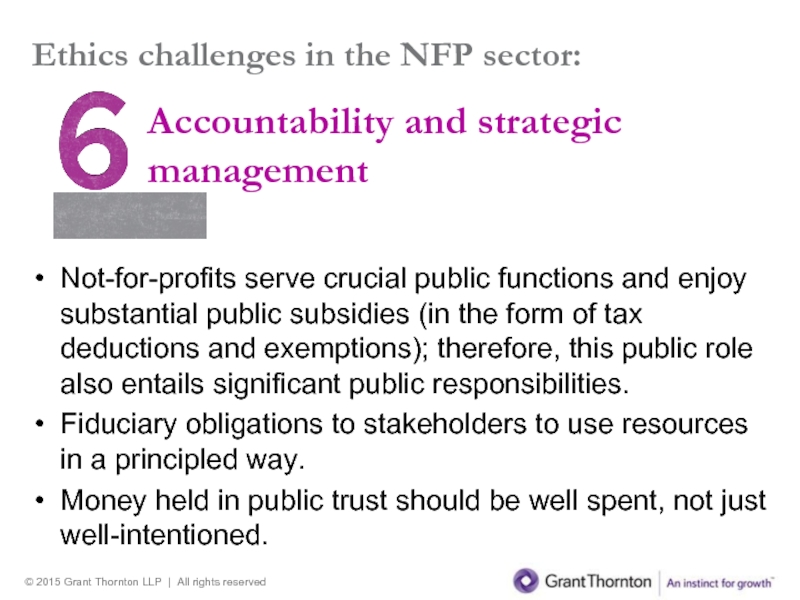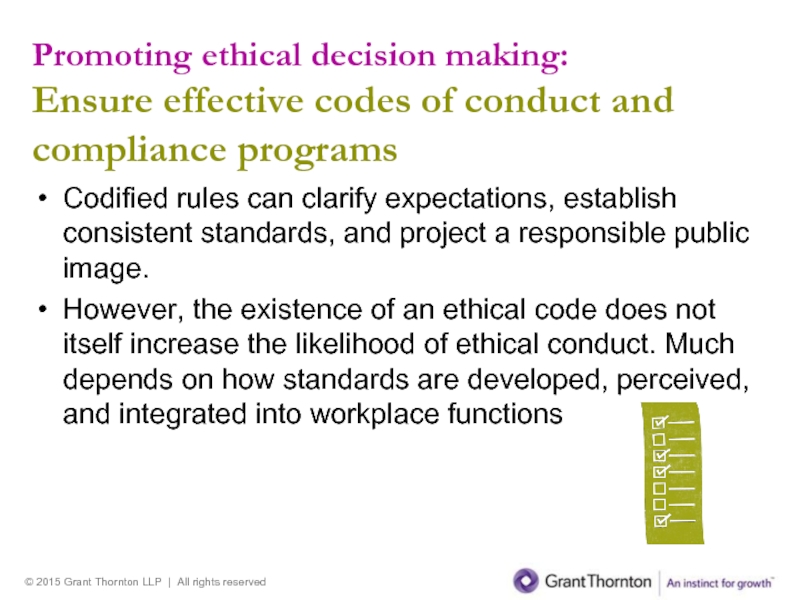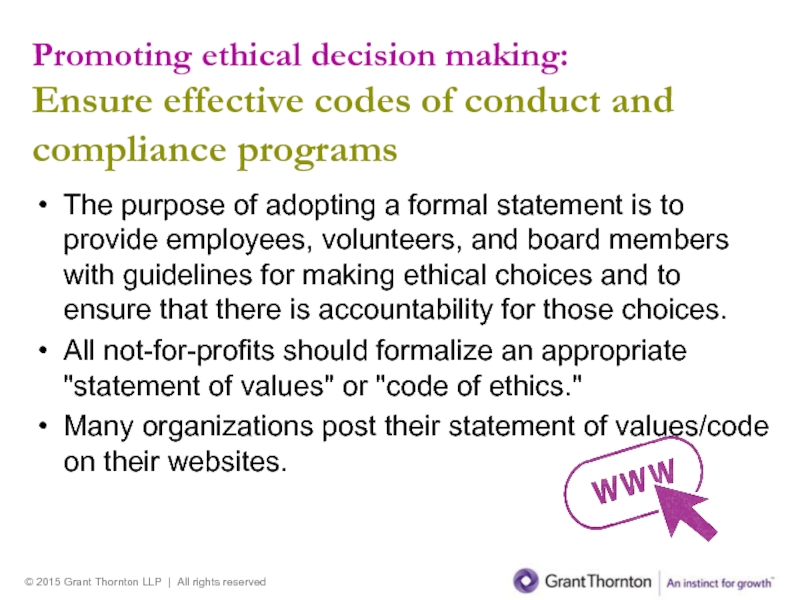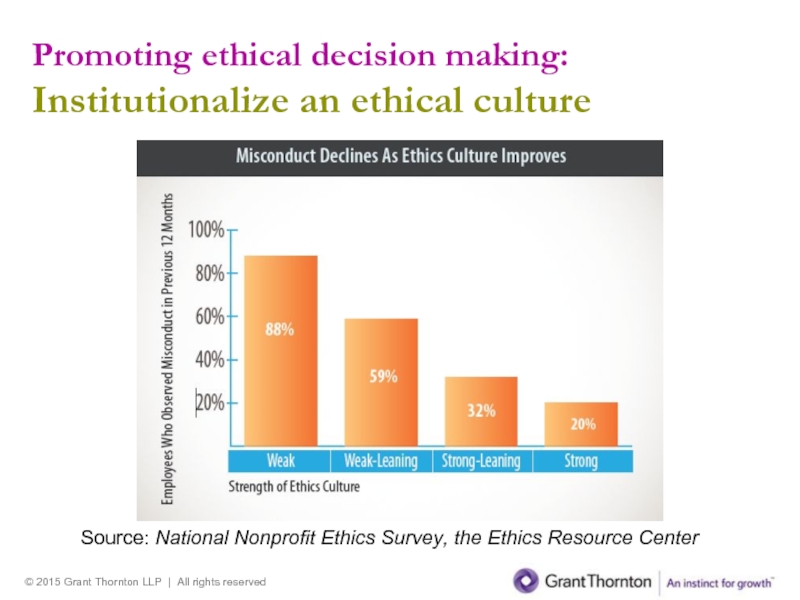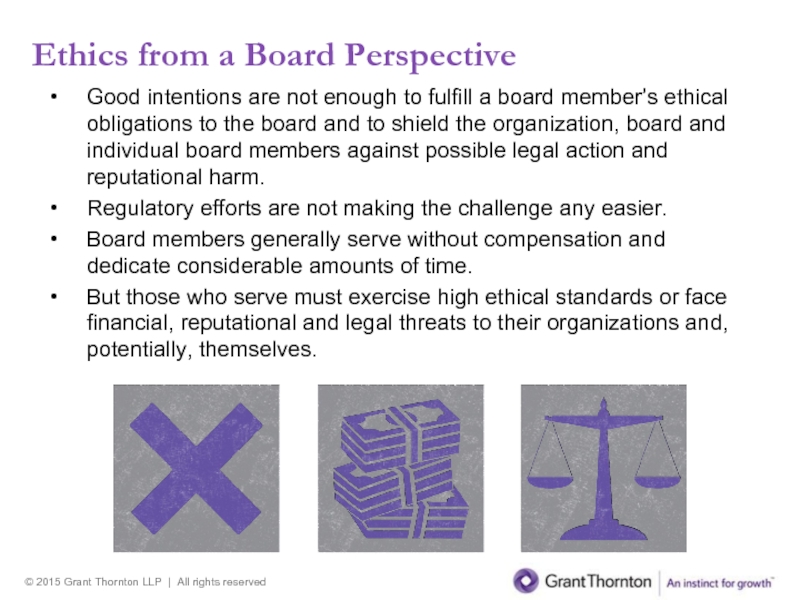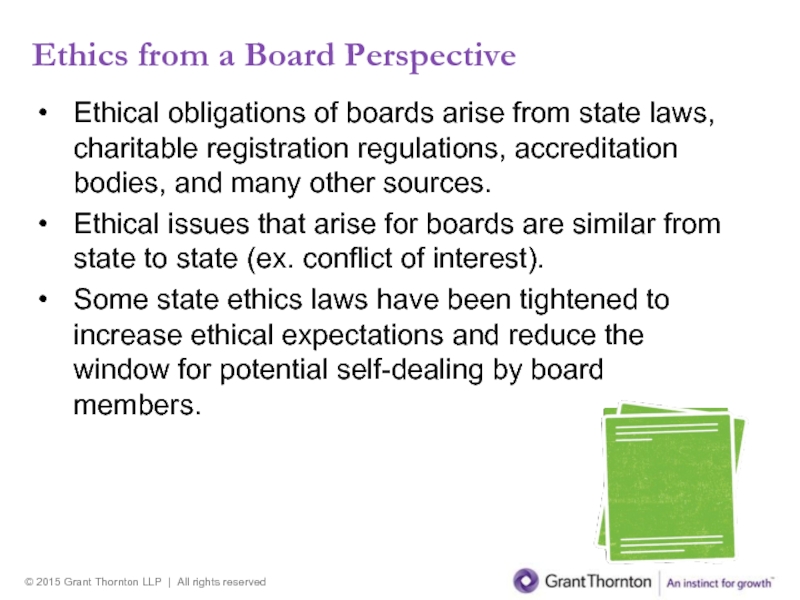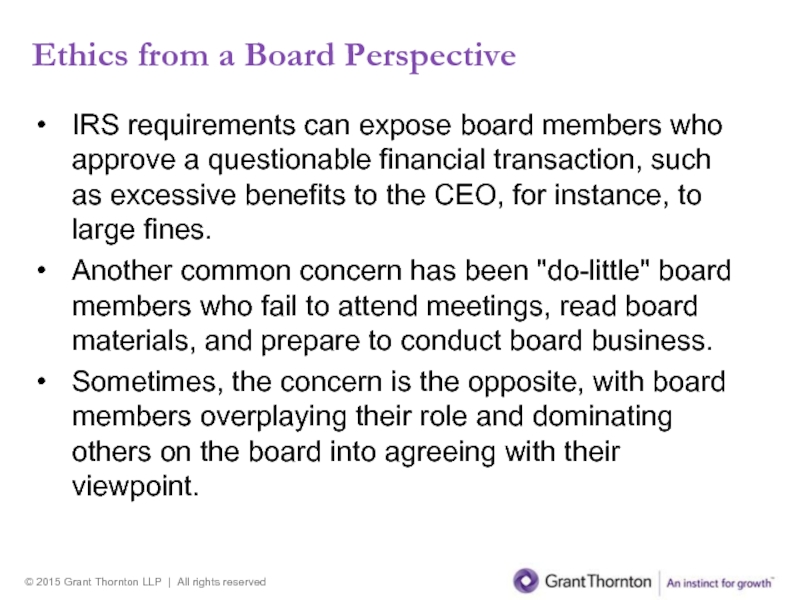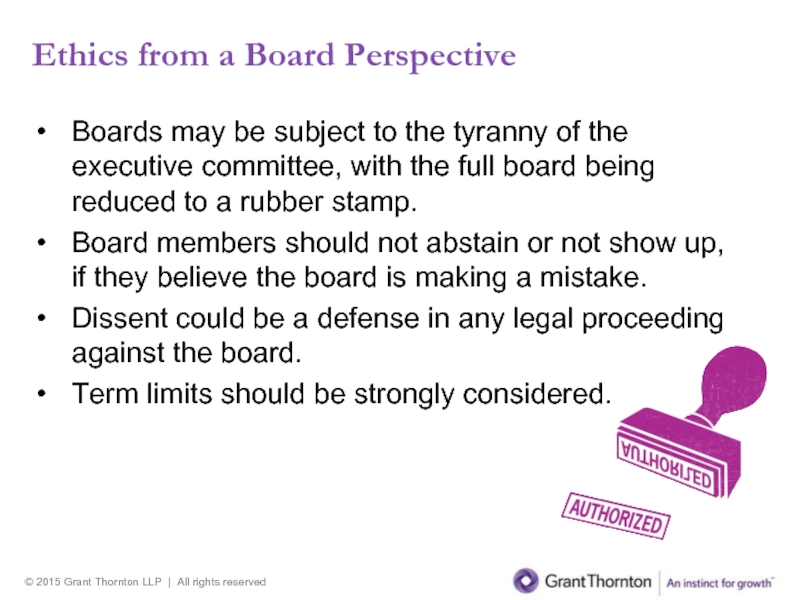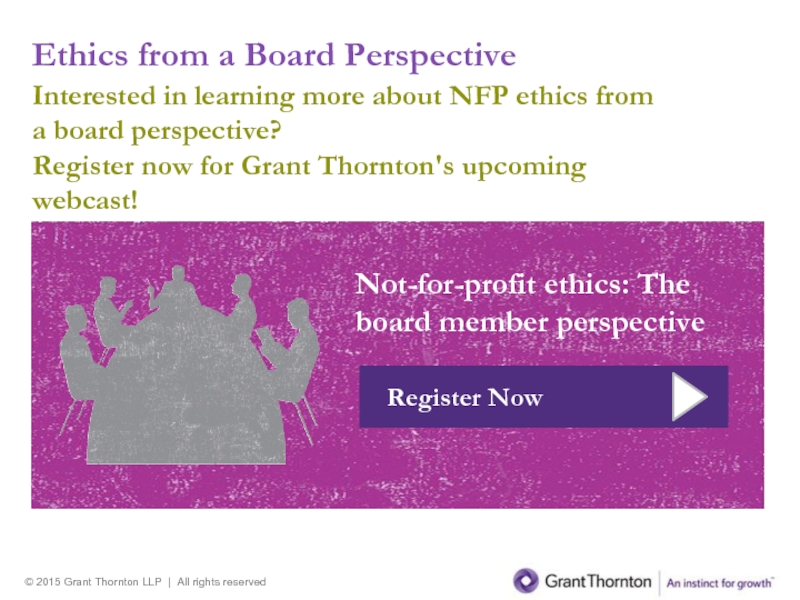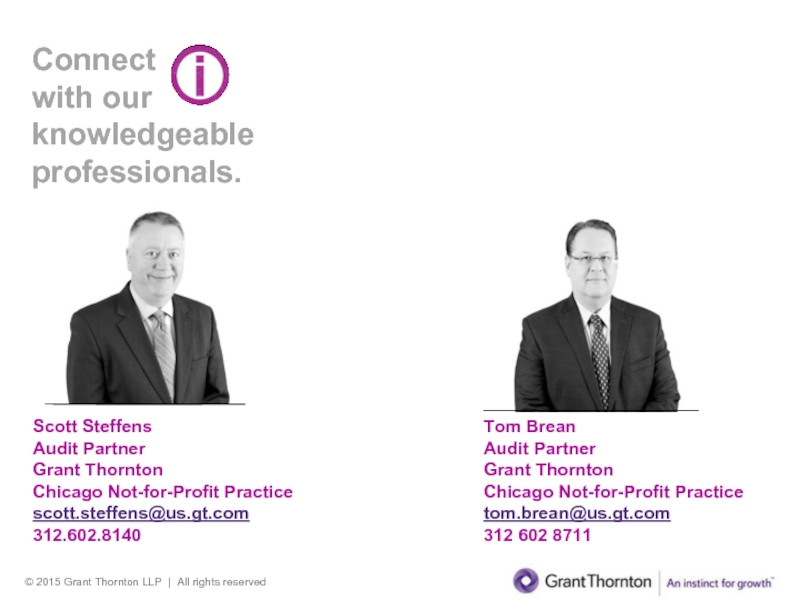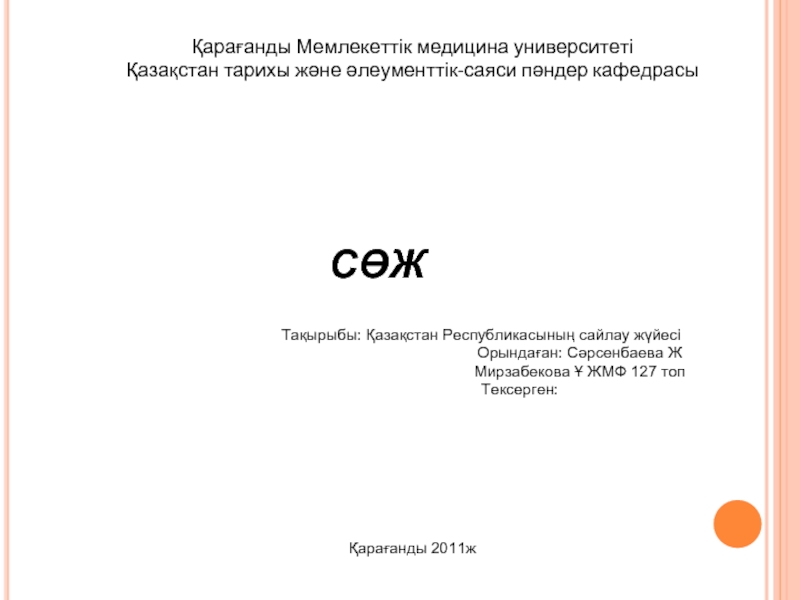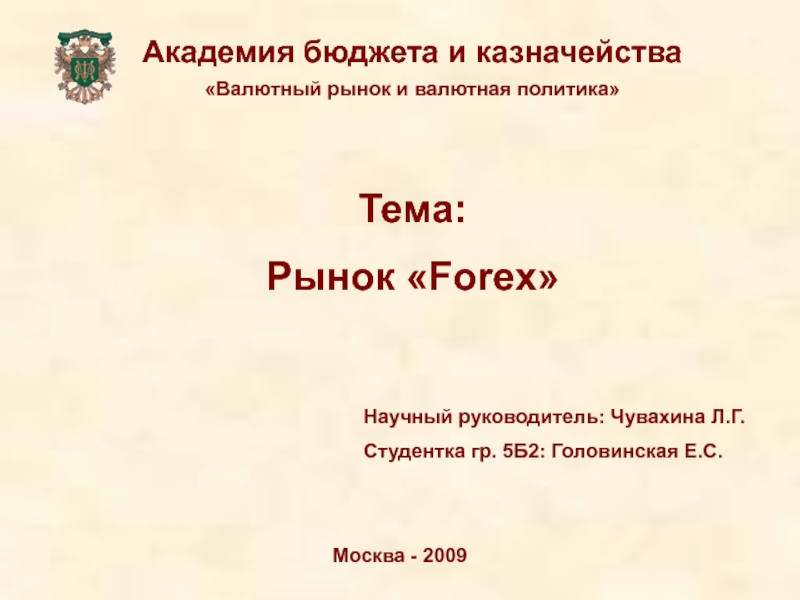- Главная
- Разное
- Дизайн
- Бизнес и предпринимательство
- Аналитика
- Образование
- Развлечения
- Красота и здоровье
- Финансы
- Государство
- Путешествия
- Спорт
- Недвижимость
- Армия
- Графика
- Культурология
- Еда и кулинария
- Лингвистика
- Английский язык
- Астрономия
- Алгебра
- Биология
- География
- Детские презентации
- Информатика
- История
- Литература
- Маркетинг
- Математика
- Медицина
- Менеджмент
- Музыка
- МХК
- Немецкий язык
- ОБЖ
- Обществознание
- Окружающий мир
- Педагогика
- Русский язык
- Технология
- Физика
- Философия
- Химия
- Шаблоны, картинки для презентаций
- Экология
- Экономика
- Юриспруденция
Not-for-Profit Ethics презентация
Содержание
- 1. Not-for-Profit Ethics
- 2. Not-for-Profit Ethics Learning objectives
- 3. Ethics Trends: The good news! Source: Ethics Resource Center, National Business Ethics Survey2/4/2014
- 4. Ethics Trends: The not-so-good news 60% of
- 5. Ethics Trends: More not-so-good news Only 63%
- 6. Ethics Trends: More not-so-good news Workers rarely
- 7. Ethics and Not-for-Profits The public holds nonprofits
- 8. Ethics and Not-for-Profits Nonprofits enjoy special tax
- 9. Ethics and Not-for-Profits Recent Headlines
- 10. Wide range of ethical challenges
- 11. Ethical challenges in the NFP sector
- 12. Ethics challenges in the NFP sector:
- 13. Ethics challenges in the NFP sector:
- 14. Ethics challenges in the NFP sector:
- 15. Ethics challenges in the NFP sector:
- 16. Ethics challenges in the NFP sector: Common limitations on gifts: Conflicts of interest
- 17. Ethics challenges in the NFP sector:
- 18. Ethics challenges in the NFP sector:
- 19. Ethics challenges in the NFP sector:
- 20. Ethics challenges in the NFP sector:
- 21. Ethics challenges in the NFP sector:
- 22. Ethics challenges in the NFP sector:
- 23. Promoting ethical decision making: Ensure effective codes
- 24. Promoting ethical decision making: Ensure effective codes
- 25. Promoting ethical decision making: Institutionalize an ethical
- 26. Ethics from a Board Perspective Good intentions
- 27. Ethics from a Board Perspective Ethical obligations
- 28. Ethics from a Board Perspective IRS requirements
- 29. Ethics from a Board Perspective Boards may
- 30. Ethics from a Board Perspective Interested in
- 31. Connect with our knowledgeable professionals. Scott Steffens
Слайд 3Ethics Trends:
The good news!
Source: Ethics Resource Center, National Business Ethics Survey2/4/2014
Слайд 4Ethics Trends:
The not-so-good news
60% of the ethical violations employees observed were
21% of respondents said they suffered from retribution as a result of reporting misconduct at their organization, just below the 22% who said the same in 2011 and much more than the 12% in 2007.
Source: Ethics Resource Center, National Business Ethics Survey, 2/4/2014
Слайд 5Ethics Trends:
More not-so-good news
Only 63% of employees in the survey said
When they do report misdeeds, employees overwhelmingly turn to their direct supervisor (82%), far more than to senior management (52%), ethics officers (15%), hotlines (16%) or external government regulators (9%).
Source: Ethics Resource Center, National Business Ethics Survey, 2/4/2014
Слайд 6Ethics Trends:
More not-so-good news
Workers rarely turn to external parties to report
Source: Ethics Resource Center, National Business Ethics Survey, 2/4/2014
Слайд 7Ethics and Not-for-Profits
The public holds nonprofits to higher ethical standards than
Unethical behavior remains a persistent problem in NFPs and for-profits alike.
Over 25% of Americans report having “a lot” of confidence in charitable organizations compared to 9 percent for government and 7 percent for major corporations.
Do nonprofits deserve that confidence?
Слайд 8Ethics and Not-for-Profits
Nonprofits enjoy special tax exemptions that promote the idea
Your stakeholders entrust to you the responsibility of running your organization successfully, sensibly and ethically.
Boards and management must demonstrate that their programs/services are effective at accomplishing their mission and run prudently and honestly.
Слайд 10Wide range of ethical challenges
Some can result in criminal violations or
Most involve gray areas - activities on the fringes of fraud, or that involve conflicts of interest, misallocation of resources, or inadequate accountability and transparency.
Слайд 12Ethics challenges in the NFP sector:
Salaries that are modest by business
Officers and unpaid board members may feel entitled to take perks because their services would be worth so much more in the private sector.
Staff and volunteers may receive unearned benefits.
Compensation
Слайд 13Ethics challenges in the NFP sector:
Common in the NFP sector
Preferential treatment
Conflicts of interest
Слайд 14Ethics challenges in the NFP sector:
In a recent survey, 20% of
In 75% of NFPs that did not report any such transactions, board members were not required to disclose financial interests in entities doing business with the organization.
Conflicts of interest
Слайд 15Ethics challenges in the NFP sector:
Many nonprofits oppose restrictions because they
Quid pro quo relationships can jeopardize an organization’s reputation for fairness and integrity in its financial dealings.
NFPs need detailed, unambiguous conflict of interest policies, including requirements that employees and board members disclose all financial interest in companies that may engage in transactions with the organization.
Conflicts of interest
Слайд 17Ethics challenges in the NFP sector:
Under the revised procurement standards in
Conflicts of interest
Слайд 18Ethics challenges in the NFP sector:
Nonprofits must have candor and accuracy
Nonprofits need to pay particular attention to transparency, including in solicitation materials, grant proposals, and donor agreements.
Publications and solicitation
Слайд 19Ethics challenges in the NFP sector:
To increase trust, organizations need to
Solicitations should give the donor a full explanation of the use of the potential gift.
Planned gift solicitations should suggest donors seek independent counsel whenever they are considering a planned gift.
Publications and solicitation
Слайд 20Ethics challenges in the NFP sector:
Nonprofits face ethical dilemmas in deciding
Gift acceptance policies should also state that gifts that are counter to or beyond the scope of the nonprofit's mission and purpose will be rejected.
Ignore the saying "Never look a gift horse in the mouth"… Look in that horse's mouth.
Financial integrity
Слайд 21Ethics challenges in the NFP sector:
Organizations may want to ensure that
Investment policies
Слайд 22Ethics challenges in the NFP sector:
Not-for-profits serve crucial public functions and
Fiduciary obligations to stakeholders to use resources in a principled way.
Money held in public trust should be well spent, not just well-intentioned.
Accountability and strategic management
Слайд 23Promoting ethical decision making:
Ensure effective codes of conduct and compliance programs
Codified
However, the existence of an ethical code does not itself increase the likelihood of ethical conduct. Much depends on how standards are developed, perceived, and integrated into workplace functions
Слайд 24Promoting ethical decision making:
Ensure effective codes of conduct and compliance programs
The
All not-for-profits should formalize an appropriate "statement of values" or "code of ethics."
Many organizations post their statement of values/code on their websites.
Слайд 25Promoting ethical decision making:
Institutionalize an ethical culture
Source: National Nonprofit Ethics Survey,
Слайд 26Ethics from a Board Perspective
Good intentions are not enough to fulfill
Regulatory efforts are not making the challenge any easier.
Board members generally serve without compensation and dedicate considerable amounts of time.
But those who serve must exercise high ethical standards or face financial, reputational and legal threats to their organizations and, potentially, themselves.
Слайд 27Ethics from a Board Perspective
Ethical obligations of boards arise from state
Ethical issues that arise for boards are similar from state to state (ex. conflict of interest).
Some state ethics laws have been tightened to increase ethical expectations and reduce the window for potential self-dealing by board members.
Слайд 28Ethics from a Board Perspective
IRS requirements can expose board members who
Another common concern has been "do-little" board members who fail to attend meetings, read board materials, and prepare to conduct board business.
Sometimes, the concern is the opposite, with board members overplaying their role and dominating others on the board into agreeing with their viewpoint.
Слайд 29Ethics from a Board Perspective
Boards may be subject to the tyranny
Board members should not abstain or not show up, if they believe the board is making a mistake.
Dissent could be a defense in any legal proceeding against the board.
Term limits should be strongly considered.
Слайд 30Ethics from a Board Perspective
Interested in learning more about NFP ethics
Register now for Grant Thornton's upcoming webcast!
Not-for-profit ethics: The board member perspective
Register Now
Слайд 31Connect
with our
knowledgeable
professionals.
Scott Steffens
Audit Partner
Grant Thornton
Chicago Not-for-Profit Practice
scott.steffens@us.gt.com
312.602.8140
Tom Brean
Audit Partner
Grant Thornton
Chicago Not-for-Profit
tom.brean@us.gt.com
312 602 8711
